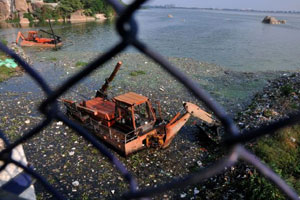
Is it possible and feasible to drain the lake Hussainsagar, clean and make it full of fresh water, as proposed by the Chief Minister, K. Chandrasekhar Rao recently?
Since the idea of emptying the body of water during the summer went public, the possibilities of taking the initiative has become a topic of discussion between management and experts.
Questions arise as to how the lake water spread over 1,200 hectares and a full tank level of 513.43 meters could be drained. With a coastline of 14 km, Hussainsagar has two outputs, one near the side of the Hotel Marriot and another in the Buddha Purnima Project (BPP) side office released from overflow.
The first step would ensure that about 50 million liters per day (MLD) linking Lake is intercepted and diverted which in turn could be an onerous task. Experts refuse to be named, said the event if this is done, the next challenge would be to drain the lake water.
"The two outputs are available for overflow which means they must be dug to facilitate the flow of water from the LCE," he says.
Although smaller lakes and ponds dried and filled in different parts of the world, the experts could not recall instances of a water main body of this size and level of water is subjected to such exercise. Even if you have created a mechanism to allow water in large quantities, it would be through densely populated towns before joining Musi River. "This could have their own adverse reactions from residents," he said.
If indeed assumed, drying exercise could last for years and every time it rains during this period, water would continue to accumulate. And then, drying would vomit several lakh square meters of sediment that would prove difficult to clean. One such official extension suspect exposed sediment could cause stench difficult to tolerate in the heart of the city.
"Theoretically possible, but practical problems we have to face are difficult to assess," said an official. The ecological impacts were not easy to estimate in advance, he said.






















